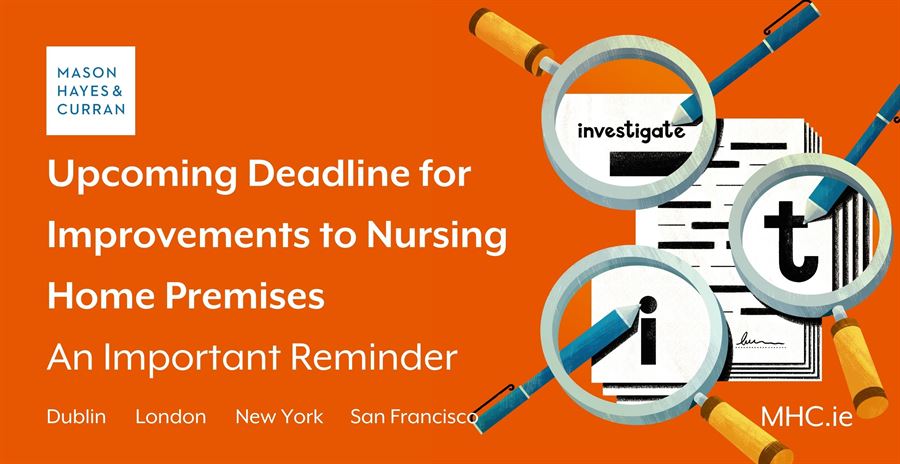
The Health Act 2007 (Care and Welfare of Residents in Designated Centres for Older People) Regulations 2013 (2013 Regulations) came into operation on 1 July 2014. This legislation imposed changes in the provision of care in nursing homes in areas like nutrition, staff requirements, and residents’ rights. It also introduced significant obligations which relate to the physical premises of nursing homes. Registered providers are now required to provide premises which conform with certain specified criteria as outlined in Schedule 6 of the 2013 Regulations. The Health Act 2007 (Care and Welfare of Residents in Designated Centres for Older People) (Amendment) Regulations 2016 (2016 Regulations) amended the 2013 Regulations by inserting further requirements into Schedule 6 and extending the deadline for compliance with some of the Schedule 6 criteria. You can review the regulations here.
With the 1 January 2022 deadline approaching, those engaged in the nursing home sector should consider the requirements and consequence of non-compliance with Schedule 6.
Current Requirements
The requirements already in place, include the following:
-
The premises must have a lay-out which meets the needs of residents, be of sound construction, and be clean and suitably decorated
-
There should be emergency call facilities on the premises, as well as grabrails in bathroom areas, handrails on stairs, and lifts where residents are on more than one level
-
There should be adequate sitting and recreational space other than a resident’s private accommodation
-
The floor space for a resident of a bedroom in a designated centre must not be reduced from the area of floor space provided for the resident on the day the 2016 Regulations came into operation, and
-
The number of residents to a bedroom in a designated centre must not be increased from the number of residents in the bedroom on the day that the 2016 Regulations came into operation.
Requirements from 1 January 2022
From 1 January 2022, nursing homes will be required to meet the following additional requirements:
-
A bedroom in a designated centre carrying on the business of a designated centre on or before 1 July 2009, or a part of a designated centre where such business was carried on before that date, will be required to have a floor area of not less than 7.4m2 of floor space. This includes the space occupied by a bed, a chair and personal storage space, for each resident of that bedroom.
-
No bedroom will be permitted to be allowed to have more than four residents. This excludes a high-dependency room, which will have no more than six residents.
-
Where a bedroom had a floor area greater than 7.4m2 when the 2016 Regulations came into force on10 June 2016, that floor area cannot be reduced.
-
The number of residents to a bedroom cannot be increased from the date the 2016 Regulations came into force.
-
On the premises, there should be dining facilities for all residents which can cater to the number of residents concerned, but not necessarily for all residents at the same sitting, and
-
Nursing homes must provide toilets which are easily accessible by, and in close proximity to, the bedrooms of every eight residents. These bathrooms do not necessarily have to be ensuite.
Failure to comply
The Health Information and Quality Authority’s (HIQA) chief inspector will be able to inspect a nursing home to assess whether it is in compliance with the Schedule 6 criteria. Following an inspection by HIQA, a registration can be revoked or made conditional as a result of statutory non-compliance which, from 1 January 2022, will include a failure to comply with Schedule 6 criteria.
A non-compliant registered provider is liable on summary conviction to a fine not exceeding €5,000 or imprisonment for a term not exceeding 12 months or both. On conviction on indictment, a non-compliant register provider is liable to a fine not exceeding €70,000 or imprisonment for a term not exceeding 2 years or both. A body corporate or a person purporting to act on behalf of a body corporate can also be proceeded against for such an offence. This can occur where it can be proved that the offence was committed with the consent or approval of, or to have been attributable to any neglect on the part of a director, member of the committee of management or other controlling authority of the body concerned or the manager, secretary or other officer of the body concerned.
Conclusion
The capital costs required to alter premises to ensure statutory compliance are a key contributor to non-compliance. However, HIQA has stated that inspections from 1 January 2022 will focus on the Schedule 6 premises requirements. This indicates that non-compliance will have consequences. Therefore, if you are an operator of a nursing home or are contemplating investing in the sector, there is still time to take steps to comply with the Schedule 6 criteria.
For more information or with any questions, please contact Eimear Lyons.
The content of this article is provided for information purposes only and does not constitute legal or other advice.






